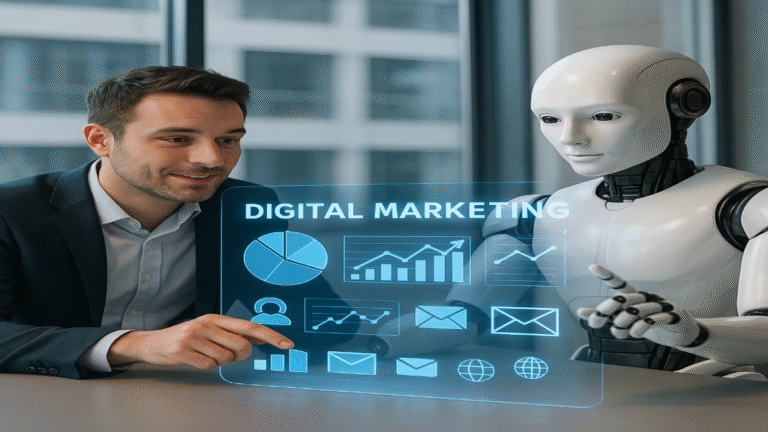
Digital Marketing for Business Growth: Why It’s Essential
Meta Description
Discover why digital marketing is essential for business growth. Learn key strategies to boost brand visibility, engagement, and revenue. Read now! (134 characters)
Introduction
In today’s fast-paced, technology-driven world, digital marketing has become the backbone of business success. Whether you’re running a small startup or managing an established enterprise, leveraging digital marketing strategies is no longer optional—it’s critical for sustainable growth. This comprehensive guide dives deep into why digital marketing is a must for business growth, explores its core components, and offers actionable insights to transform your brand’s online presence. From increasing visibility to driving conversions, digital marketing is a game-changer. Let’s explore why it’s essential and how you can harness its power to propel your business forward.
What is Digital Marketing?
Digital marketing encompasses all online marketing efforts aimed at promoting a brand, product, or service through digital channels. These channels include search engines, social media platforms, email, websites, mobile apps, and online advertisements. Unlike traditional marketing, digital marketing enables businesses to connect with their audience in real-time, track performance, and optimize campaigns for maximum impact.
The goal of digital marketing is to attract, engage, and convert potential customers while fostering brand loyalty. Its versatility and data-driven approach make it an indispensable tool for businesses looking to thrive in a competitive landscape.
Why Digital Marketing is Essential for Business Growth
1. Global Reach and Accessibility
Unlike traditional marketing, which is often constrained by geography, digital marketing allows businesses to reach a global audience. With a well-optimized website, social media presence, or targeted ad campaign, your brand can connect with customers across borders without needing a physical storefront.
For example, a small e-commerce store in New York can sell products to customers in Tokyo through targeted Google Ads or Instagram campaigns. This accessibility levels the playing field, enabling businesses of all sizes to compete globally.
2. Cost-Effective Marketing
Digital marketing is significantly more affordable than traditional methods like TV commercials or print ads. Small businesses with limited budgets can leverage tools like social media marketing, email campaigns, or search engine optimization (SEO) to achieve impressive results without breaking the bank.
For instance, running a pay-per-click (PPC) campaign on Google Ads allows you to set a daily budget and only pay when someone clicks on your ad. This ensures you’re spending money on actual engagement rather than broad, untrackable exposure.
3. Targeted Audience Engagement
One of the biggest advantages of digital marketing is its ability to target specific audiences based on demographics, interests, behaviors, and location. Platforms like Facebook Ads and Google Ads provide advanced targeting options, ensuring your marketing efforts reach the right people at the right time.
For example, a fitness brand can target health-conscious individuals aged 18–35 who follow fitness influencers on Instagram. This precision increases the likelihood of conversions and maximizes return on investment (ROI).
4. Measurable Results and Analytics
Unlike traditional marketing, where success is often hard to quantify, digital marketing provides detailed analytics to track performance. Tools like Google Analytics, HubSpot, and social media insights allow businesses to monitor metrics such as website traffic, click-through rates, conversion rates, and customer engagement.
These insights enable businesses to refine their strategies in real-time. For instance, if an email campaign isn’t generating clicks, you can tweak the subject line or content to improve performance. This data-driven approach ensures continuous improvement and better results.
5. Builds Brand Awareness and Trust
A strong online presence helps establish your brand as an authority in your industry. Consistently sharing valuable content—such as blog posts, videos, or infographics—builds trust with your audience and positions your business as a go-to resource.
For example, a digital marketing agency that regularly publishes SEO tips on its blog is more likely to attract clients who value expertise. Additionally, engaging with customers on social media or responding to reviews fosters a sense of community and loyalty.
6. Drives Website Traffic and Conversions
Digital marketing channels like SEO, content marketing, and PPC are designed to drive traffic to your website. Once visitors arrive, well-crafted landing pages and compelling calls-to-action (CTAs) encourage them to take desired actions, such as making a purchase, signing up for a newsletter, or requesting a quote.
For instance, optimizing your website for relevant keywords (e.g., “best digital marketing services”) can attract organic traffic from search engines, increasing the chances of converting visitors into customers.
7. Adapts to Changing Consumer Behavior
Modern consumers spend a significant amount of time online, researching products, reading reviews, and engaging with brands on social media. Digital marketing allows businesses to meet customers where they are, delivering personalized experiences that resonate.
For example, 80% of consumers are more likely to purchase from a brand that offers personalized experiences, according to a study by Epsilon. By leveraging data from digital campaigns, businesses can tailor their messaging to individual preferences, boosting engagement and loyalty.
8. Supports Long-Term Growth
Digital marketing isn’t just about immediate results; it’s a long-term investment in your brand’s growth. Strategies like SEO and content marketing may take time to yield results, but they create a sustainable pipeline of leads and customers.
For example, a blog post optimized for a high-traffic keyword can continue driving organic traffic to your website for years, generating leads without additional costs. This scalability makes digital marketing ideal for businesses aiming for consistent growth.
Key Components of Digital Marketing
To fully harness the power of digital marketing, businesses must leverage a combination of strategies tailored to their goals. Here are the core components:
1. Search Engine Optimization (SEO)
SEO involves optimizing your website to rank higher on search engine results pages (SERPs) for relevant keywords. By improving site structure, content, and backlinks, businesses can attract organic traffic from platforms like Google and Bing.
Tips for SEO Success:
- Conduct keyword research to identify high-traffic, low-competition keywords.
- Create high-quality, informative content that answers user queries.
- Optimize on-page elements like meta titles, descriptions, and headers.
- Build authoritative backlinks from reputable websites.
2. Content Marketing
Content marketing focuses on creating and distributing valuable content to attract and engage your target audience. This includes blog posts, videos, eBooks, infographics, and podcasts.
Why Content Marketing Matters:
- Educates your audience about your products or services.
- Boosts SEO by providing fresh, keyword-rich content.
- Encourages sharing on social media, increasing brand visibility.
3. Social Media Marketing
Social media platforms like Instagram, Facebook, LinkedIn, and Twitter are powerful tools for connecting with your audience. By sharing engaging content and running targeted ads, businesses can build a loyal following and drive traffic to their websites.
Best Practices:
- Post consistently and use visuals to capture attention.
- Engage with followers through comments, polls, and stories.
- Use platform-specific features, like Instagram Reels or LinkedIn articles, to stand out.
4. Pay-Per-Click (PPC) Advertising
PPC ads, such as ]such as Google Ads or social media ads, allow businesses to display ads to targeted audiences and pay only when users click. PPC is ideal for driving immediate traffic and generating leads.
PPC Tips:
- Use precise targeting to reach your ideal audience.
- Create compelling ad copy with strong CTAs.
- Monitor and optimize campaigns to improve ROI.
5. Email Marketing
Email marketing remains one of the most effective ways to nurture leads and retain customers. Personalized email campaigns can promote products, share updates, or offer exclusive discounts.
How to Succeed with Email Marketing:
- Segment your email list based on user behavior or preferences.
- Craft attention-grabbing subject lines to boost open rates.
- Include clear CTAs to drive conversions.
6. Affiliate and Influencer Marketing
Partnering with influencers or affiliates can amplify your brand’s reach. Influencers promote your products to their followers, while affiliates earn commissions for driving sales through unique links.
Why It Works:
- Leverages the trust influencers have built with their audience.
- Expands your reach to new, relevant audiences.
- Drives conversions through authentic recommendations.
How to Implement Digital Marketing for Your Business
Step 1: Define Your Goals
Identify what you want to achieve with digital marketing, such as increasing website traffic, generating leads, or boosting sales. Clear goals will guide your strategy and help measure success.
Step 2: Understand Your Audience
Create buyer personas to understand your target audience’s demographics, interests, and pain points. Use tools like Google Analytics or social media insights to gather data.
Step 3: Choose the Right Channels
Not all digital marketing channels are suitable for every business. For example, a B2B company may prioritize LinkedIn and email marketing, while a fashion brand may focus on Instagram and PPC.
Step 4: Create a Content Plan
Develop a content calendar to ensure consistent posting across channels. Include a mix of educational, promotional, and engaging content to keep your audience interested.
Step 5: Monitor and Optimize
Use analytics tools to track campaign performance. Test different strategies, such as A/B testing email subject lines or tweaking ad copy, to improve results over time.
Common Digital Marketing Mistakes to Avoid
- Ignoring SEO: Neglecting SEO can result in low website visibility and missed opportunities for organic traffic.
- Focusing Solely on Sales: Constantly pushing sales can alienate your audience. Balance promotional content with value-driven posts.
- Neglecting Mobile Optimization: With over 50% of web traffic coming from mobile devices, ensure your website and campaigns are mobile-friendly.
- Not Tracking Results: Without analytics, you can’t measure success or identify areas for improvement.
- Inconsistent Branding: Maintain a cohesive brand voice and visual identity across all channels to build trust.
Why Digital Marketing is the Future of Business Growth
The digital landscape is constantly evolving, with new technologies like artificial intelligence, voice search, and immersive storytelling shaping the future of marketing. Businesses that adapt to these trends and invest in digital marketing will stay ahead of the curve.
For example, voice search optimization is becoming critical as more consumers use devices like Amazon Alexa or Google Home to find products. Similarly, video marketing is booming, with 85% of businesses using video as a marketing tool in 2024, according to Wyzowl.
By staying agile and embracing innovation, businesses can use digital marketing to not only survive but thrive in an increasingly competitive market.
Conclusion
Digital marketing is no longer a luxury—it’s a necessity for businesses aiming to grow and succeed in the modern world. Its ability to reach global audiences, deliver measurable results, and adapt to consumer behavior makes it an unparalleled tool for driving brand awareness, engagement, and revenue.
By investing in strategies like SEO, content marketing, social media, and email campaigns, businesses can build a strong online presence and foster long-term growth. Start small, track your progress, and continuously optimize your efforts to unlock the full potential of digital marketing.
Ready to take your business to the next level? Begin by auditing your current digital presence and identifying areas for improvement. With the right strategy, digital marketing can transform your brand and pave the way for sustainable success.



